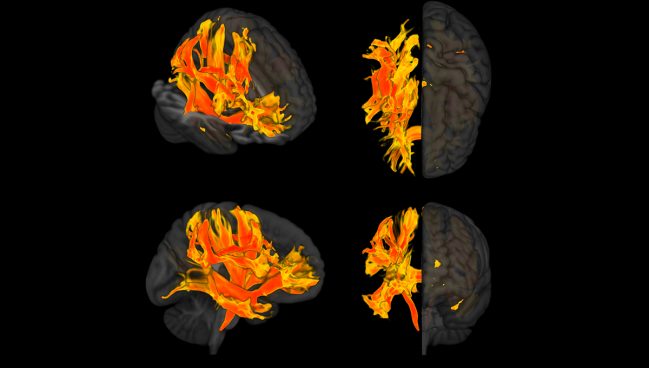Brain Areas Identified Linking High BP and Cognitive Impairment
The findings open new avenues for research into potential therapeutic targets for hypertension-related cognitive problems.

3D reconstruction shows how high systolic BP can impact white matter in the brain: red areas were most affected, while yellow areas were affected but to a lesser extent (Photo Credit: Lorenzo Carnevale)
Drawing on imaging, genetics, and observational data, researchers have identified the specific areas of the brain that appear to be involved in cognitive impairment in the setting of high blood pressure.
Though the link between hypertension and poor cognition, possibly explained by damage to the microvasculature, has been well established in prior studies, it wasn’t clear which areas of the brain were most strongly implicated. Pinpointing these regions has implications for honing risk prediction and may potentially yield targeted therapies, researchers say.
The regions pinpointed in the current study include the putamen as well as areas in the white matter containing the anterior thalamic radiation, the anterior corona radiata, and the anterior limb of the internal capsule, which are responsible for executive functions, the planning of daily tasks, decision-making, and emotion management.
“These are all known to be perturbed in patients with long-lasting hypertension,” senior author Tomasz Guzik, MD, PhD (University of Edinburgh, Scotland, and Jagiellonian University, Krakow, Poland), explained to TCTMD.
“Using genetic causal reasoning, we are able to narrow down the relationship to very specific locations in the brain, and I think that’s a big part of the value of this study,” he said. “It helps to provide clues not only mechanistically about which sites could play a role, but potentially could be used in the future by others to monitor these areas as future imaging biomarkers in hypertensive patients at higher risk of cognitive impairment.”
The study was published online this week in the European Heart Journal, with lead author Mateusz Siedlinski, PhD (University of Edinburgh and Jagiellonian University).
Systolic BP Especially Impactful
The investigators used a combination of genetic, mendelian randomization, and observational analyses to study how functional and structural changes in the brain related to both blood pressure and cognitive function. Data were obtained from sources that included the UK Biobank, the International Consortium for Blood Pressure, the COGENT consortium, and a prospective validation cohort of 116 individuals with hypertension or normotension.
From 3,935 brain MRI-derived phenotypes (encompassing both structure and function), the researchers identified 242 that were affected by changes in systolic BP, which was seen to be a more important contributor than diastolic BP, Guzik said. Of these, nine locations were determined to be potentially involved in mediating the association between high BP and cognitive impairment. The important role these areas of the brain play in this relationship was bolstered by analyses in the observational cohorts.
The study “strengthens the understanding that we really need to ensure good blood pressure control in our patients, because the higher the blood pressure, the more damaging to our brain function this will be,” Guzik said. “So at the moment, while we still haven’t defined specific therapies for preventing cognitive impairment, hypertensive patients must control their blood pressure using both pharmacology and lifestyle measures” that include exercising and avoiding salt in the diet.
Next Steps
Moving forward, Guzik said that advancements in imaging technology may provide even greater insights into the brain structures involved in the link between hypertension and cognitive impairment, and possibly enable the creation of a simple score that can be used to identify patients most at risk. That will require appropriately designed clinical studies, he stressed, but such a score could, perhaps, provide a means to identify patients who would benefit from early interventions and assess the efficacy of medications for preventing cognitive impairment.
“While clinical trials targeting specific brain structures may be challenging, focused imaging of these structures in future preclinical and clinical studies may, in due course, support a more-personalized approach to hypertensive patients in relation to cognitive impairment,” the researchers write.
In an accompanying editorial, Ernesto Schiffrin, MD, PhD, and James Engert, PhD (both from McGill University, Montreal, Canada), say the study represents “progress towards providing a mechanistic understanding of the effects of blood pressure on cognition.”
But additional studies are needed, they add. “In addition to replication, the challenge will be to extract the maximum utility from these results. Most probable in the near term will be the identification of research directions to build on the current results to provide a mechanistic understanding of the roles of specific brain areas susceptible to high BP,” they say.
“Eventually, biomarkers could be developed to inform antihypertensive trials,” the editorialists suggest. “Whether clinical trials targeting the specific brain structures will be feasible or if specific antihypertensives could be found that target specific structures remains to be demonstrated. Thus, these new studies could lead to an understanding of the signaling pathways that explain how these structures relate vascular damage to cognitive impairment in hypertension, and contribute to the development of novel interventions to more successfully address the scourge of cognitive decline and dementia in the future.”
Todd Neale is the Associate News Editor for TCTMD and a Senior Medical Journalist. He got his start in journalism at …
Read Full BioSources
Siedlinski M, Carnevale L, Xu X, et al. Genetic analyses identify brain structures related to cognitive impairment associated with elevated blood pressure. Eur Heart J. 2023;Epub ahead of print.
Schiffrin EL, Engert JC. Hypertension, brain imaging phenotypes, and cognitive impairment: lessons from mendelian randomization. Eur Heart J. 2023;Epub ahead of print.
Disclosures
- The study was funded by the European Research Council, the British Heart Foundation, CVD ERA-CVD, and the Italian Ministry of Health.
- Guzik reports receiving funding from the British Heart Foundation.
- Siedlinski, Shiffrin, and Engert report no relevant conflicts of interest.




Comments